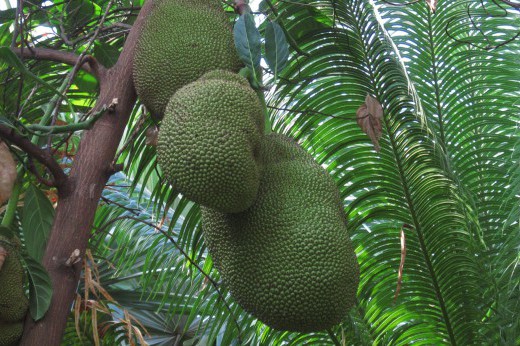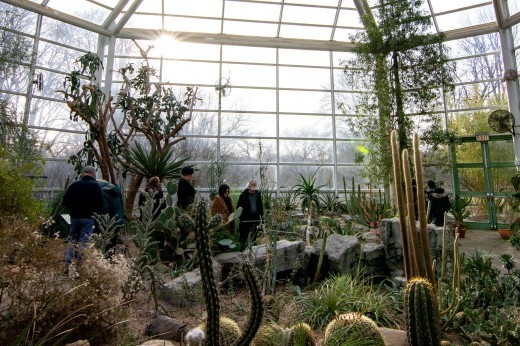The Tropical Pavilion is full of treasures, especially at this time of year. While the Steinhardt Conservatory often serves as a warm oasis in the winter months, now, in midsummer, is when the Tropical Pavilion is abundant with ripening fruits and flowers in full bloom. Textures, colors, and aromas of these rare plants fill the Conservatory, and it’s easy to feel instantly transported to a lush, aromatic world.
Gingers, arums, and birthwort wonders
Spiral Flag
Costus barbatus
This ginger’s common name refers to the spiral arrangement of its foliage. Yellow, tubular flowers bloom between red, overlapping bracts. Spiral flag spreads with underground rhizomes and is native to Costa Rica, where it attracts hummingbirds.
Dancing Girl Ginger
Globba schomburgkii
Dainty yellow flowers bloom on the terminal inflorescence of this dwarf ginger. Native to Vietnam, Thailand, India, and Myanmar, it spreads through rhizomes as well as bulbils.
Arrowroot
Tacca sp.
This arrowroot, sometimes called “bat flower,” boasts clusters of dark purple flowers with bract “wings” and long, whisker-like tendrils. Native to South China and Malaysia, this understory plant prefers a deeper shade. Arrowroot is a member of the Dioscoreaceae, or yam family.
Amorphophallus bulbifer
A member of the Araceae, or arum family, this bulbous, herbaceous plant is native to South Asia. Boasting glossy leaves and mottled stems, it forms small bulbils that fall to the ground. It is also a relative of the well-known corpse flower (Amorphophallus titanum).
Giant Dutchman’s-Pipe
Aristolochia gigantea
This twining climber is native to the forests of Brazil. It boasts large burgundy flowers with veinlike patterns and a light green pouch. Its strong fragrance attracts flies, which pollinate the flowers. Giant dutchman’s-pipe is a member of the Aristochiaceae, or birthwort family.
Elephant-apples, jackfruit, and fruits of the tropics
Elephant-Apple
Dillenia indica
This tree’s common name refers to its fruit being a main source of food for elephants. Striking, cream-colored flowers mature to glossy, round fruits with layers of smooth green “petals.” Elephant-apple is native to India and southern China.
Jackfruit
Artocarpus heterophyllus
Artocarpus heterophyllus bears the largest fruit in the world. The recognizable, spiky jackfruit can weigh up to 80 pounds. Jackfruit is a member of the Moraceae, or fig family.
Papaya
Carica papaya
Native to the rainforests of southern Mexico and Central America, a single papaya fruit can yield hundreds of seeds. Before maturing to fruit, clusters of waxy, cream-colored flowers adorn the tree, alongside large, palmately lobed leaves.
The oldest conservatory specimen
East Indian Sago-Palm
Cycas circinalis
Acquired by Brooklyn Botanic Garden in 1917—just a few years after the Garden officially opened—this sago-palm is the oldest specimen in the Conservatory. A member of the Cycadaceae, or cycad family, the sago-palm is a gymnosperm, and not a true palm.












